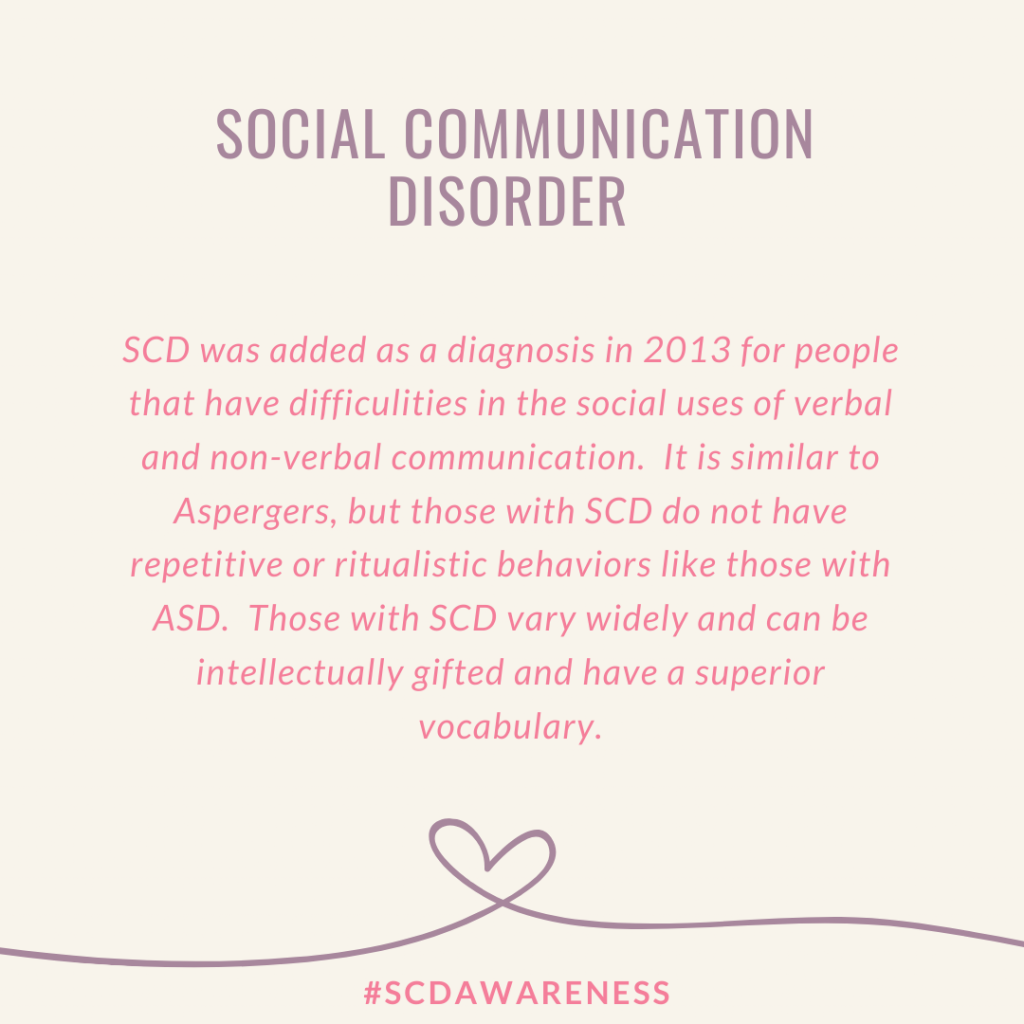
You’ve just gotten the DSM-5 diagnosis of F80.89 – Social Communication Disorder from the neuropsychologist after having comprehensive neuropsychological testing done on your child. You’ve likely also received a diagnosis of GAD , ADHD , ODD , and/or SPD – an alphabet soup describing your child’s neurodiversity. (For those of you unfamiliar with the terms: GAD is Generalized Anxiety Disorder, ADHD is Attention Deficient Hyperactive Disorder, ODD is Oppositional Defiant Disorder, and SPD is Sensory Processing Disorder.)
You start to research each diagnosis, looking for ways to help your child. You find plenty of information on everything but SCD, also known as Social Pragmatic Communication Disorder or SPCD. That’s the path I took when my daughter was first diagnosed with SCD. I was frustrated by the lack of information and with how few people had ever heard of SCD. I’m hoping what I’ve learned will help you out as a parent of a newly diagnosed kid with SCD.
The first thing you need is an understanding of social pragmatics. Social pragmatics refer to the way people use language within social situations. It has three components:
- The ability to use language for different purposes
- The ability to adapt language to meet the needs of the listener or situation
- The ability to follow the often unspoken rules of conversation and storytelling
Children with SCD have trouble with all three of these components. These kids struggle with:
- Proper way to greet others in different situations
- Sharing information that is appropriate for the situation
- Speaking differently based on the situation
- Controlling their volume when they talk
- Talking differently to children than to teachers and other adults
- Taking turns in conversations
- Making odd and/or irrelevant comments
- Understanding and interpret tone of voice in others
- Reading facial expressions
- Picking up on social cues through others’ body language
- Recognizing idioms, humor, metaphors, and sarcasm
- Topics/tasks they do not find interesting
- Recognizing and respecting others’ personal space
- Being sensitive to criticism
- Understand other people’s point of view
- Repeating content
- Making and keeping friends
A lot of kids with SCD would have gotten a diagnose of Asperger’s Syndrome prior to 2013. Asperger Syndrome is no longer a diagnoses in the DSM-5. There is now just the diagnoses of Autism Spectrum Disorder (ASD). The main difference between SCD and ASD is the lack of restrictive and/or repetitive patterns of behavior, interests or activities seen in kids with ASD. Before receiving a diagnoses of SCD, ASD has to be ruled out. You can not be diagnosed with both SCD and ASD.
Due to the newness of this diagnoses, teachers will often label these children as “bad kids”. Most teachers have never heard of SCD and have no idea that the child’s “bad behavior” is caused by this disorder. It is our job as parents of these kids to educate their teachers about this disorder. They truly aren’t intending to be rude, they just don’t get it. They don’t understand body language, they don’t get facial expressions, and they aren’t able to decipher tone of voice.
These kids need assistance and guidance in how to appropriately respond in different social situations. Social concepts of reputation and image are not something they really understand. All of these challenges can make navigating the social complexities of adolescence extremely difficult. They often do not respond in a manner that is typical or expected and are often misunderstood.
Everything said is taken very literally by these kids. They tend to interpret the world in black and white terms and miss the underlying gray tones that exists in every social interaction. They have a hard time making and keeping friends. They are frequently the target of bullying and are often ostracized by their peers.
The main question you will have is how to help your child that was just diagnosed with SCD. Look for a speech therapist that specializes in pragmatic language. A therapist will be able to provide individual therapy tailored to help your child with the areas they struggle with. A social skills group is also beneficial for helping these kids. The group setting helps to reinforce the skills they learn during the individual therapy sessions.
You may find difficulty getting your insurance to cover treatment for SCD. This is due to the lack of research based treatment for SCD, likely due to the newness of the diagnosis. Check to see what coverage your insurance provides with regards to speech therapy, then seek out a therapist from the list they provide.
